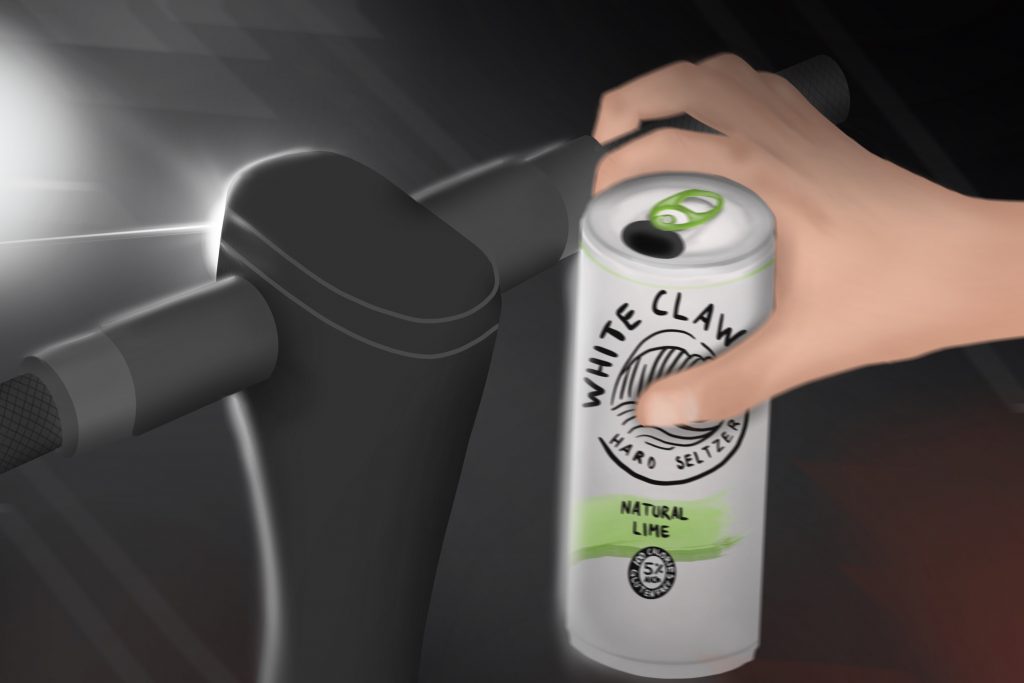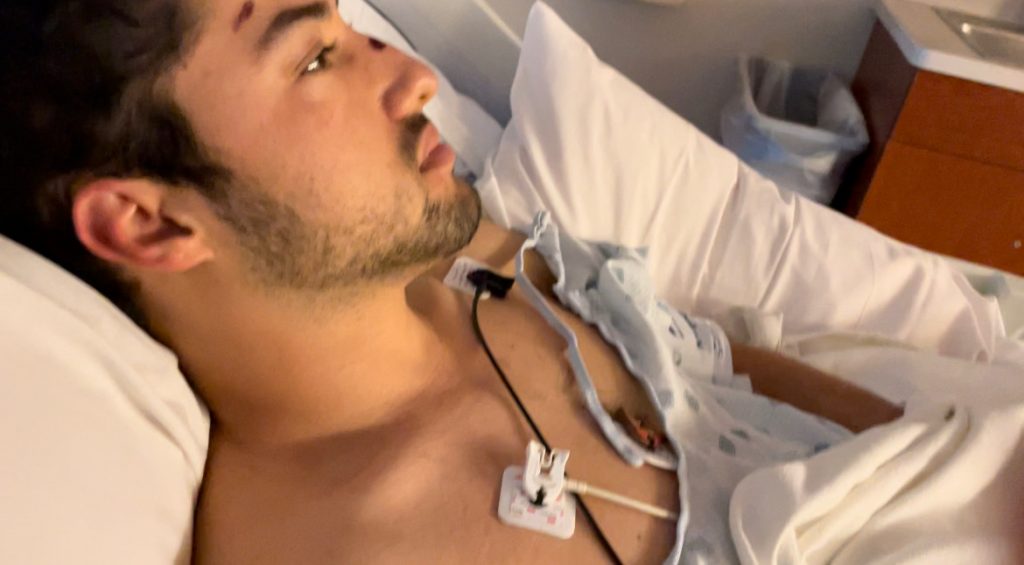Drunk e-scootering is the new drunk driving
Drunk e-scootering is the new drunk driving

Noam Siegel was strapped to an ambulance stretcher, moving from one hospital to another. Fading in and out of consciousness, Siegel wondered to himself, “What the heck is going on,” even though he couldn’t find the words to express it.
The accident that landed him here happened only a few weeks earlier. The twenty-two-year-old was out drinking with his college friends on the main street of the University of California, Santa Barbara’s downtown.
When he got home, he received a text from a friend who lived three blocks away, asking him to come over. Siegel told him he’d be right there, grabbed his electric skateboard and headed out the door.
But somewhere along the way, Siegel fell and hit his head. He said he vaguely remembers calling his roommate because he couldn’t remember where he lived. His college roommate said Siegel somehow made it home that night with his white Vans covered in blood.
The morning after his accident, the effects kicked in more. Siegels’ roommate noticed him slurring his words and told Siegel he needed to go to the hospital. Although Siegel refused to get in the car at first, his roommate eventually buckled him in.
When Siegel arrived at the hospital in Santa Barbara, doctors diagnosed him with a traumatic brain injury. He spent two weeks at the hospital, half in a coma, half out, barely able to communicate his thoughts or feelings, before being transferred to another hospital closer to home. Siegel said he doesn’t remember much from those two weeks besides a few doctors that appear in his head and a really, really good hamburger.

Siegel isn’t alone in facing the consequences of drunk riding e-scooters, e-skateboards and e-bikes on college campuses. Many believe that electric vehicles are fun and cheap, making them more appealing to college students. But according to the United States Consumer Product Commission, injuries from using these transportation methods jumped 70% in the past four years. And a research study by UCLA shows that riders are typically young, drunk and without a helmet.
Siegel said he lost his whole memory in the accident. He suffered from anomic aphasia, forgot all his childhood memories and was forced to put school on hold.
To relearn English, doctors at the hospital played memory games with him. They’d hold up a card, teach him the word and he’d try to find its match. Siegel said at first, he was learning 150 words a day. After a few days, he started aiming for about 250 words daily.
One time, Siegel played a memory game that required him to pair up matching tiles. A five-by-10 arrangement of tiles laid in front of him. Siegel picked up a cat tile and put it down. He grabbed a bird next. Then, another cat. But by that time, Siegel said he forgot where the other cat tile sat in the arrangement.
While Siegel didn’t care about forgetting basic objects like a cat or a bird, the difficult part for him was forgetting important memories and his family.
“They’d show me a picture of my brother, and I’d say, ‘Who is this?’” Siegel said. “My life was like a giant puzzle that was put together over 22 years of being alive. And then, with me hitting my head at 3:30 a.m. on September 25th, that whole puzzle that built up broke into pieces.”
Education about drunk driving has increased nationally in recent years. Growing up, Siegel said he learned in school never to get behind the wheel of a car under the influence. According to the Centers for Disease Control and Prevention, the percentage of teens in high school who drink and drive has decreased by more than half since 1991. National campaigns, including “Drive Sober or Get Pulled Over,” contributed to lowering the number of fatal car accidents.
But Siegel said the problem with these campaigns is that they don’t discuss the effects of drunk driving vehicles other than cars. So while college students like him understand the effects of drinking and driving a car, the consequences of drinking and driving e-vehicles don’t necessarily cross their minds until it’s too late.
Siegel can’t recall the exact amount of alcohol he drank the night of his accident. He said he didn’t get his blood alcohol level tested, and the police weren’t involved in the case at any point. Much of that night is blurry for him — including where he fell.
He said that while you can read as many books as you want about dying or coming close to dying, nothing beats it like coming close to death yourself.
“It is a whole other way of looking at the world when you realize how much you could have lost,” Siegel said.
Although Siegel fell off his personal e-skateboard, accidents like his are becoming common — especially for college students where e-vehicles grow more accessible on campus.
In recent years, e-vehicle companies, like Bird and VEO, partnered with universities to reduce traffic congestion and reach climate goals. But unlike cars, by federal law, you don’t need a license to ride an e-vehicle.
A spokesperson for Bird said the mobility company is currently partnered with 130 colleges and universities to provide students with affordable, sustainable, and reliable transportation. When schools partner with Bird, the spokesperson said, Bird gives the universities control over scooters on their campuses. But with the recent influx of e-vehicle accidents, Bird said they’ve also increased safety regulations.
Each Bird scooter now contains instructions on when and how to ride, and each rider agrees to follow local safety and traffic regulations, which include not riding under the influence. The companies also invested in new technology and services to increase safety, including a Beginner Mode with gradual acceleration and an in-app checkpoint designed to discourage people from riding under the influence called Safe Start, Bird’s Visual Parking System and Smart Sidewalk Detection.
“We’re always working with our university partners to find ways to continue providing the best-in-class experience for riders and our communities,” the Bird spokesperson said.
But for college students like Blanca Lopez, the safety features of e-vehicles remain unknown. The Syracuse University student said she wishes there was some kind of protection on the speed limit on scooters, not knowing this feature already exists on vehicles on her campus.
SU is currently partnered with the mobility company VEO. On campus, a VEO is $1 to unlock, then $0.20 per minute to ride a Halo bike and $0.31 per minute to ride an Astro scooter. When a SU student decides to ride a VEO vehicle, they locate one on campus and unlock it using an app on their smartphone.
Lopez said this year, out of nowhere, she noticed VEO scooters and bikes appear all over campus. But after her e-vehicle accident last year, she refuses to ride one ever again.
In April 2022, Lopez and her friend left to go to a party at a fraternity house when it started to rain. The SU students decided to call an Uber, but when they noticed how far away the car was, the two canceled their ride. Instead, they found a VEO scooter nearby and rode on it together.
As they arrived at the party, they hit a bump and Lopez flew off. She landed face forward and her left front tooth came out.
Being from Los Angeles, Lopez didn’t have dental insurance on campus. For five days, she walked around SU with a broken tooth. She said it hurt so much that she couldn’t eat. Later on, doctors told her she would need a root canal. The only solution to get her tooth fixed was to take a $600 flight home.
“I was drunk,” Lopez said. “I wasn’t thinking about what could happen and how riding an electric scooter drunk is actually pretty dangerous.”
Since talking with people about her accident, Lopez said she’s realized how common drunk e-vehicle accidents are for college students. Now, she always encourages people to walk or pay for an Uber.
Driving under the influence is illegal in every state. But when it comes to driving e-vehicles, the line gets blurry.
John Sardino, deputy chief of the department of Public Safety at SU, said every state has different rules or regulations for driving e-vehicles while impaired. States, including California, have DUI laws that apply to motorized scooters like Bird and VEO. Penalties for this range from fines to jail time.
Sardino said when someone gets injured at SU from an e-vehicle, they’re reported as an injury report since they aren’t considered motorized vehicles. So far, the handful of reports Sardino’s received hasn’t been severe, but he said it usually takes a tragic event for people to realize something needs to change.
At this point, Sardino said e-vehicles at SU are here to stay. He said he believes companies like VEO are making lots of money, so moving forward, he expects there to be more, not less, of them on campus.
“Like with anything new, the laws, the city and even the state haven’t really caught up with the industry,” Sardino said. “They’re a motorized type of motorized transportation, so there’s a lot of conversation about whether these vehicles should have to be registered or whether you have to have a license to operate one on a city street or on any street, but legislatively we just haven’t caught up yet.”
Other campuses are also looking to create more regulations around e-vehicles. With the recent rise in e-vehicle accidents, campuses, including James Madison University in Virginia, require students to wear helmets while riding. According to the school newspaper “The Breeze,” Bird scooters on campus are also deactivated from 9 p.m. to 7 a.m. Other schools, including Marquette University, banned e-vehicles altogether.
But for some college students riding e-vehicles drunk remains a risk they’re willing to face.
An SU student who broke his nose riding an electric scooter drunk said despite his accident, they still ride, many times under the influence.
After the student’s accident, a friend gave them a lecture on how riding an e-vehicle drunk is the same as drunk driving. They said she told him he needs to be smarter with his decision-making and get an Uber instead of putting himself in danger.
They said they like the thrill and fun of drunk riding and aren’t ready to give it up any time soon.
“Not that I drink and drive, but I’d much rather get on a scooter than get in a car after drinking,” the student said. “I think it’s not very often that people get hurt by them, but when people get hurt from them, it’s better than crashing into another car or hitting someone with yours.”





